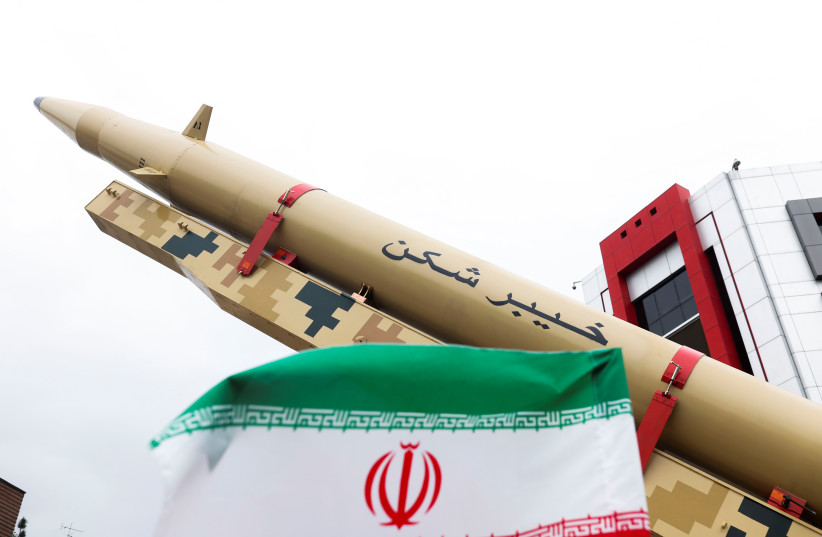While Tehran is good at weaving the scenarios that it wants to export to the world, it is well aware that its turn is coming.
It is expected that in the post-Gaza era, Israel will move to hold Iran accountable (along with its terrorist militia arms in Lebanon, Yemen, and Iraq) for its responsibility in supporting and financing the terrorists’ weapons that have been attacking Israel and the United States since last October 7.
Holding Iran accountable
There are successive and remarkably intense media leaks circulating in several reports regarding the parameters of Iran’s responsibility for the decision by the Hamas terrorist movement to launch attacks against Israel, on October 7.
These leaks began with a report on the content of the meeting between Iranian Supreme Leader Ali Khamenei and Ismail Haniyeh, chairman of Hamas’s politburo – in Tehran in the first week of November.
The report stated that Khamenei informed Haniyeh that Iran would not interfere in the conflict since Hamas had not informed in advance of its decision to attack Israel – a report that Iran and Hamas denied completely.

The Hamas terrorist movement said, in a statement published on Telegram: “Commenting on what was reported by Reuters news agency about Ismail Haniyeh’s meeting with Ali Khamenei, the leader of the Islamic Revolution in Iran, we deny the validity of what was stated in this report, and we regret publishing the news. It has no basis, and we call on the agency to investigate accuracy,” he said, without mentioning any other details.
The agency had quoted what it called three “senior” officials from Iran and Hamas as saying that when they met, the Iranian leader transmitted a clear message to Haniyeh, to the effect that since Hamas had not informed Tehran in advance of the attack of October 7, Iran would not enter the war on behalf of Hamas.
Media reports also mentioned that the blame directed by Hamas leader Khaled Mashaal was aimed at Hezbollah and included Iran – when he said, in mid-October, that “Hezbollah thankfully took steps, but my assessment is that the battle requires more, and what is happening is okay, but it is not enough,” and that he believed what was required was more than a “flood,” and that history was not about “limited, timid, hesitant steps,” but rather about “thought-out adventures.”
This story is part of a series that questions Iran’s responsibility for the Hamas terrorist attack.
There are several important American media sources that also quoted officials from Iran and Hezbollah saying that the Hamas attack was a surprise to them and that they had no prior knowledge of this attack, as the movement concealed the details of the timing, size, and target.
All of these simultaneous narratives are in the interest of several parties, the first of which, of course, is Iran and Hezbollah, which want to be content with media and propaganda appearances in the Gaza conflict scene without paying a strategic cost. That may lead to the destruction of the party’s capabilities, and expose the Iranian regime to a strong Israeli strike in light of American-European green.
The second of these parties is the United States, which does not want to hold Iran responsible for the Hamas decision because it is in its tactical interest to keep Iran away from responsibility for this decision. Linking Tehran to the attack on Israel would mean closing the curtain on reviving the Iranian nuclear agreement once and for all.
In addition, the current American administration is exposed to Republican pressure from within, as well as from Israel to retaliate against Iran or at least deal with it more strictly; or give Israel the green light to launch a retaliatory strike to deter its support for terrorism and organizations that threaten Israel’s security.
The conclusion is that the interests of Iran and the United States converge upon the idea of undermining Tehran’s responsibility for Hamas’s decision to attack Israel, and therefore it is likely that the leak reported by Reuters is true, and that it was intentional on the Iranian side. The reality is that it is very difficult for the decision to attack the terrorist movement Hamas to have been made in isolation from Iran and Hezbollah.
We remember the statement of Hamas spokesman Ghazi Hamad to the BBC, days after Hamas’s attack on Israel: “I am proud,” regarding the amount of support the terrorist movement had received from Iran to carry out this operation. “There are countries that help us. Iran helps us, whether with money, weapons, or political support, there is no harm in us doing that.”
At the very least, incitement and encouragement by Tehran and Hezbollah for the terrorist movement Hamas to carry out the attack is consistent with expectations. The attack was timed in Iran’s interest, at the height of talks for imminent normalization between the Kingdom of Saudi Arabia and Israel.
The conversation has now been postponed indefinitely. Riyadh, with all its spiritual, religious, political, and strategic weight, finds it difficult to adopt the step of normalizing relations with Israel under the current circumstances.
My conviction is that Iran has begun a journey of intensifying its efforts to evade direct responsibility for Hamas’s decision, in light of the destruction it is witnessing in the Gaza Strip and the collapse of the Palestinian cause and the terrorist Hamas movement.
Iran did not want to bear responsibility for the wrong decision and chose to sacrifice Hamas to preserve what remained of its terrorist militia arms, which could be exposed to subsequent intense military strikes if Iran was proven responsible for the attacks that Israel was subjected to over the past period.
The writer is a UAE political analyst and former Federal National Council candidate.
